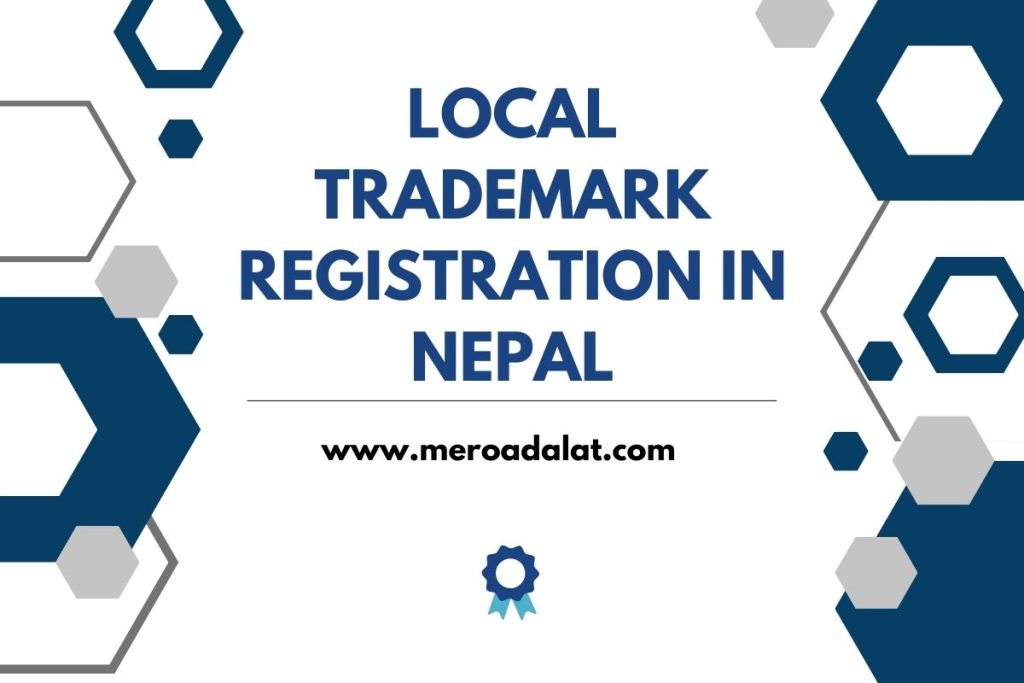This article will guide you through all the legal provisions relating to local trademark registration in Nepal.
Local Trademark Registration in Nepal begins with Trademark Research followed by the Submission of Application with relevant documents, getting the certificate of registration and finally its timely renewal.
A trademark not only safeguards one’s brand identity in Nepal but also provides a unique identification that differentiates your goods or services from others.
Whether it’s a unique name, a symbolic graphic, or a combination of both, your trademark becomes a company’s business’s identity, setting it apart in a competitive marketplace.
For Example: The logo of Apple which is globally recognized, is its Trademark.

What is Local Trademark in Nepal?
To enjoy the full protection of Local trademarks in Nepal, it’s essential to have them registered under the Patent, Design, and Trademark Act of 1965.
Once registered, you will hold the exclusive rights to your trademark, ensuring no other entity can use it without your permission.
Local Trademark Registration in Nepal prevents any potential form of Infringement and Duplication and legally legitimizes your Company‘s identity.
Local Trademark Registration in Nepal – Detail Processes
Trademark Research: Before beginning local trademark registration in Nepal, it’s important to conduct thorough research to ensure your chosen trademark isn’t already in use or resembles an existing one. This step can save you from future litigations and ensure your brand’s unique standing.
Application Submission: Once you’re confident about your trademark’s uniqueness, you’ll need to apply with Nepal’s Department of Industry. The necessary documents required are:
- Company registration or product/service license.
- Four copies of the trademark model.
- A letter of authorization, if someone else is registering on your behalf.
- Receipt of the application fee payment.
Examination: After your application is submitted, it goes through an official examination, which might take around 3 to 5 months. This process ensures that your trademark adheres to Nepal’s set guidelines and doesn’t violate any existing trademarks.
Publication in IP Bulletin: Once approved, your trademark will be published in the IP Bulletin. This publication is a way to inform the general public and potential competitors about your pending registration.
Opposition Period: From the date of publication, there’s a 90-day window during which anyone can oppose your trademark registration if they believe it violates on their rights.
Certificate of Registration: If there is no legitimate objections arise during the opposition period, the Department of Industry will finalize your trademark registration, granting you a certificate. This document of Local Trademark Registration in Nepal solidifies your exclusive rights to the trademark.
Renewal: Your trademark’s protection isn’t indefinite. Its validity lasts for seven years from the date of registration. However, you can renew it every seven years, ensuring your business’s brand protection for as long as you operate. You must renew the trademark within 35 days from the expiration date to maintain its validity.
Fees and Timelines
The application fee for trademark registration is NPR 1,000, and once approved, a registration fee of NPR 5,000 is applicable. Generally, the entire process, if unopposed, takes approximately 12 to 14 months.
Grounds for Refusing Local Trademark Registration in Nepal
Understanding the regulations about trademark registration in Nepal is necessary for businesses. The Department of Industry (DOI), under section 18(1) of the Patent, Design, and Trademark Act (PDTA), has clear stipulations regarding the grounds for refusal of a trademark application.
- Reputation Damages: If the proposed trademark harms the reputation of any individual or institution, the DOI can reject its registration.
- Prior Registration: Any trademark already registered under someone else’s name will be rejected to avoid duplication.
- Contradiction with social Morals: Trademarks that clash with public conduct, societal morals, or the national interest can face refusal.
- Goodwill Harm: If a trademark causes harm to the goodwill of another entity’s trademark, it won’t be accepted.
Selling Registered Trademark in Nepal
You can sell and buy trademarks just like the other properties if you have completed Local Trademark Registration in Nepal. The process of selling and buying a trademark is known as “Assignment”. After buying the trademark the new owner (assignee) has full rights over the trademark.0
The new owner should actively use the trademark in its registered domain, if they don’t, they might lose it. The value of a trademark depends on its use, how unique it is, how long it’s been around, and its reputation.
Conclusion
If you’re planning to run a business or offer a product/service in Nepal, getting your trademark registered is an important and smart move. It gives your brand a unique identity and keeps others from copying it.
You need to check if your trademark is truly unique, submit all the right papers, and renew it every seven years. By following these steps, you’ll make sure your local trademark stands out and stays protected in the market through local trademark registration in Nepal.
